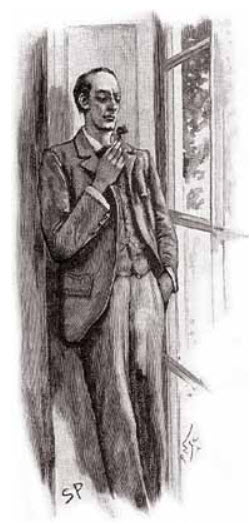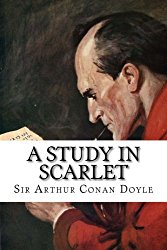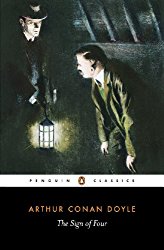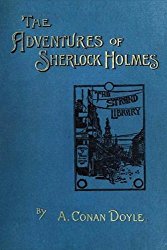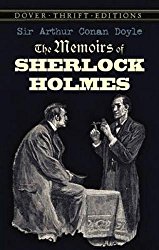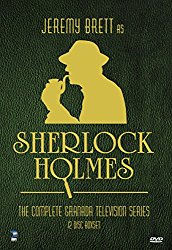Sherlock Holmes on Religion
by Drew R. Thomas
When Dr. John H. Watson first resided with Sherlock Holmes in the rooms at 221B Baker Street, he became so intrigued about Holmes's enigmatic character that he was preoccupied for a time.
Contrasting Holmes's wealth of knowledge on certain obscure subjects against his apparent lack of knowledge on better-known topics, Watson wrote, "His zeal for certain studies was remarkable, and within eccentric limits his knowledge was so extraordinarily ample and minute that his observations have fairly astounded me." (A Study in Scarlet, chapter 2.) Watson continued, "His ignorance was as remarkable as his knowledge. Of contemporary literature, philosophy and politics he appeared to know next to nothing."
When Holmes professed ignorance of the Copernican Theory, Watson tells us, "That any civilized human being in this nineteenth century should not be aware that the earth travelled round the sun appeared to be to me such an extraordinary fact that I could hardly realize it."
This led to the following conversation between Holmes and Watson:
|
"You appear to be astonished," he said, smiling at my
expression of surprise. "Now that I do know it I shall do my
best to forget it."
"To forget it!"
"You see," he explained, "I consider that a man's brain
originally is like a little empty attic, and you have to
stock it with such furniture as you choose. A fool takes in
all the lumber of every sort that he comes across, so that
the knowledge which might be useful to him gets crowded out,
or at best is jumbled up with a lot of other things so that
he has a difficulty in laying his hands upon it. Now the
skillful workman is very careful indeed as to what he takes
into his brain-attic. He will have nothing but the tools
which may help him in doing his work, but of these he has
a large assortment, and all in the most perfect order.
It is a mistake to think that that little room has elastic
walls and can distend to any extent. Depend upon it there comes
a time when for every addition of knowledge you forget something
that you knew before. It is of the highest importance, therefore,
not to have useless facts elbowing out the useful ones."
"But the Solar System!" I protested.
"What the deuce is it to me?" he interrupted impatiently;
"you say that we go round the sun. If we went round the moon it
would not make a pennyworth of difference to me or to my work."
--A Study in Scarlet,
chapter 2 |
|
|
Click Image to
Order from Amazon
(As an Amazon Associate
I earn from
qualifying purchases.)
Click the image below to
Read the Reviews:
|
As true to Holmes's precepts as this explanation may be, one can't help but consider that Holmes may well have been employing a tad bit of hyperbole simply to make a point. When one later observes Holmes quoting from literature, as in the following examples, one becomes convinced that Holmes told Watson his "brain-attic" theory with a nod and a wink.
|
- Holmes said to Watson, "You may remember
the old Persian saying, 'There is danger for him who taketh the tiger
cub, and danger also for whoso snatches a delusion from a woman.'
There is as much sense in Hafiz as in Horace, and as much
knowledge of the world."
--"A Case of Identity"
|
- Compare Ecclesiastes 10:8 from the Bible
("He that diggeth a pit shall fall into it; and whoso breaketh
an hedge, a serpent shall bite him." King James Version [KJV])
and Psalm 7:16 ("His mischief shall return upon his own head,
and his violent dealing shall come down upon his own pate."
[KJV]) with the following:
"It is a swamp adder!" cried Holmes; "the deadliest snake in
India. He has died within ten seconds of being bitten. Violence
does, in truth, recoil upon the violent, and the schemer falls
into the pit which he digs for another. Let us thrust this
creature back into its den, and we can then remove Miss Stoner to
some place of shelter and let the county police know what has
happened."
--"The Speckled Band"
|
-
Holmes's knowledge of the Bible extends
to the story of David and Bathsheba, as the following passage
shows:
"Come, Watson, I don't think we shall be
wanted in Aldershot any more."
"There's one thing," said I, as we walked down to the
station. "If the husband's name was James, and the
other was Henry, what was this talk about David?"
"That one word, my dear Watson, should have told me
the whole story had I been the ideal reasoner which
you are so fond of depicting. It was evidently a term
of reproach."
"Of reproach?"
"Yes; David strayed a little occasionally, you know,
and on one occasion in the same direction as Sergeant
James Barclay. You remember the small affair of Uriah
and Bathsheba? My biblical knowledge is a trifle
rusty, I fear, but you will find the story in the
first or second of Samuel."
--"The Crooked Man" |
|
In The Sign of the Four, Holmes reveals that his reading extends beyond the scope of knowledge of immediate concern to his work. At the beginning of his investigation into the Mary Morstan case, Holmes remarks to Watson, "...I am going out now. I have some few references to make. Let me recommend this book,--one of the most remarkable ever penned. It is Winwood Reade's 'Martyrdom of Man.' I shall be back in an hour." (Chapter 2). Watson tells us, "I sat in the window with the volume in my hand, but my thoughts were far from the daring speculations of the writer."
|
Click Image to
Order from Amazon
(As an Amazon Associate
I earn from
qualifying purchases.)
Click the image below to
Read the Reviews:
|
Toward the end of the Morstan case, Holmes, Watson and police inspector Athelney Jones are on a stakeout. Watson writes:
"That is Jacobson's Yard,"
said Holmes, pointing to a bristle of masts and rigging on the
Surrey side. "Cruise gently up and down here under cover of this
string of lighters." He took a pair of night-glasses from his
pocket and gazed some time at the shore. "I see my sentry at his
post," he remarked, "but no sign of a handkerchief."
|
"Suppose we go down-stream a short way and lie in wait for them,"
said Jones, eagerly. We were all eager by this time, even the
policemen and stokers, who had a very vague idea of what was
going forward.
|
"We have no right to take anything for granted," Holmes answered.
"It is certainly ten to one that they go down-stream, but we
cannot be certain. From this point we can see the entrance of
the yard, and they can hardly see us. It will be a clear night
and plenty of light. We must stay where we are. See how the
folk swarm over yonder in the gaslight."
|
"They are coming from work in the yard."
|
"Dirty-looking rascals, but I suppose every one has some little
immortal spark concealed about him. You would not think it, to
look at them. There is no a priori probability about it. A
strange enigma is man!"
|
"Some one calls him a soul concealed in an animal," I suggested.
|
"Winwood Reade is good upon
the subject," said Holmes. "He remarks that, while the
individual man is an insoluble puzzle, in the aggregate he
becomes a mathematical certainty. You can, for example, never
foretell what any one man will do, but you can say with
precision what an average number will be up to. Individuals
vary, but percentages remain constant. So says the
statistician...."
|
|
--The Sign of the Four, chapter 10 |
|
Holmes's reference to "some little immortal spark" smacks of at least an acquaintance with the "Divine spark" belief of early Greek Gnostic religion.
In a remarkable passage in "The Naval Treaty," Holmes interrupts his investigation of a case to speculate on the nature of religion and the goodness of Providence. Watson describes the scene as Holmes concludes his interview with Percy Phelps and Miss Annie Harrison:
"Thank you. I have no doubt I can get details from
Forbes. The authorities are excellent at amassing
facts, though they do not always use them to
advantage. What a lovely thing a rose is!"
|
He walked past the couch to the open window, and held
up the drooping stalk of a moss-rose, looking down at
the dainty blend of crimson and green. It was a new
phase of his character to me, for I had never before
seen him show any keen interest in natural objects.
|
"There is nothing in which deduction is so necessary
as in religion," said he, leaning with his back
against the shutters. "It can be built up as an exact
science by the reasoner. Our highest assurance of the
goodness of Providence seems to me to rest in the
flowers. All other things, our powers our desires,
our food, are all really necessary for our existence
in the first instance. But this rose is an extra.
Its smell and its color are an embellishment of life,
not a condition of it. It is only goodness which
gives extras, and so I say again that we have much to
hope from the flowers."
|
Percy Phelps and his nurse looked at Holmes during
this demonstration with surprise and a good deal of
disappointment written upon their faces. He had
fallen into a reverie, with the moss-rose between his
fingers. It had lasted some minutes before the young
lady broke in upon it.
|
"Do you see any prospect of solving this mystery, Mr.
Holmes?" she asked, with a touch of asperity in her
voice.
|
"Oh, the mystery!" he answered, coming back with a
start to the realities of life. "Well, it would be
absurd to deny that the case is a very abstruse and
complicated one, but I can promise you that I will
look into the matter and let you know any points which
may strike me."
|
"Do you see any clue?"
|
"You have furnished me with seven, but, of course, I
must test them before I can pronounce upon their
value."
|
"You suspect some one?"
|
"I suspect myself."
|
"What!"
|
"Of coming to conclusions too rapidly."
|
"Then go to London and test your conclusions."
|
"Your advice is very
excellent, Miss Harrison," said Holmes, rising.
|
|
--"The Naval Treaty" |
|
|
Note:
Sydney Paget's famous "What a lovely thing a rose is" illustration accompanied the story "The Naval Treaty." See how closely Jeremy Brett emulated Paget's illustration by clicking here. Many other illustrations by Sidney Paget can be found here.
|
|
Holmes's professed lack of interest in philosophy (and religion) is belied by his words and actions. Watson's earlier presumptions are at least partially erroneous. As he came to know Holmes better, Dr. Watson was more able to understand the hidden depths of the master detective's personality.
|
Click Image to
Order from Amazon
(As an Amazon Associate
I earn from
qualifying purchases.)
Click the image below to
Read the Reviews:
|
Click Image to
Order from Amazon
(As an Amazon Associate
I earn from
qualifying purchases.)
Click the image below to
Read the Reviews:
|
The Complete Granada BBC Television series, starring Jeremy Brett as Sherlock Holmes, is available.
Click Image to
Order from Amazon
(As an Amazon Associate
I earn from
qualifying purchases.)
Click the image below to
Read the Reviews:
Sherlock Holmes | Home
Amazon and the Amazon logo are trademarks of Amazon.com, Inc. or its affiliates.
(This is a link through which I make a small commission if you buy. See here for more details.)
